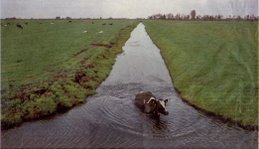The paper obtained documents from the The Hague Defense Ministry (under a Law for Government Transparency, the "Wet Openbaarheid Bestuur" or "WOB") that tell a part of the story that was left out of the comments of Dutch Government in November, when the scandal broke.
The Dutch Marine Batallion that controlled the southern Al-Muthanna Province during eighteen months in 2003/2004 had a particular status. It was not part of the occupying powers (the "Coalition"). It had to restore and maintain law and order in the province under British supervision. Eventual detainees had to be handed over to Iraqi authorities (common criminals) or to the British army with headquarters in Basra (insurgents, Baath people, intruders from other countries).
The Dutch miltary Intelligence "MIVD" ("Militaire Inlichtingen- en Veiligheids Dienst") people were also subject to those rules. In spite of that, they set up their own headquarters in the "Coalition" post in the provincial capital, where they "interviewed" detainees for some days, between their capture and their transfer to the British military in Basra.
When the Dutch commander was alerted about the "robust" methods of interrogation being used by the MIVD, he asked expanations, which he got.:
- Waterboarding of detainees was explained in that report as "the need to keep the detainee awaked" during nocturnal interrogations,
- while the use of deafening sound was justified by the need of avoiding communication between detainees.
- The use of darkened ski-goggles on detainees (as blindfolds) was needed to avoid identification by them of their interrogators.
The man accepted this, until he got another report from his liaison officer in Basra, saying that the MIVD had explained to the British, that the mentioned interrogation "techniques" had been used as a means of coercion. That was not only in contravention to the Dutch rules of engagement, but also of the Geneva Conventions.
The commander alerted the General Staff in The Hague. An inquiry was ordered by the Minister to be done by the Military Police.
And, after that, NOTHING. The stories differ. The Minister (still in office as caretaker after the general elections lost by his party, and the fall of the Balkenende III government), says that he got no further information and assumed, that a conclusion had been reached that there had not been any reprehensible conduct. The (former) Commander in Chief says that Military Justice did not see a reason to act in this case, while the Chief of the MP thinks, that the report wasn't even transmitted to Military Justice.
Our opinion is, that this is not merely a sad story of overzealous intelligence people.
It shows a state of mind that points to:
- Contamination by the Guantanamo methods, transmitted by the American Commander of that camp to Iraq during his 2003 mission;
- an undisciplinary attitude of the intelligence agents
- their probable coverage by elements within the armed forces and, perhaps, the minister himself;
- and, as their exactions remained unpunished, a probable continuation of those practices in Afghanistan during the Dutch "commando" support to the American campaign "Enduring Freedom", and:
- a documented follow-up of these doings during the Dutch "reconstruction" mission in Afghanistan (Tarin Kowt, Uruzgan), where they effectively terrorize the populations, thus making any effort by the regular Dutch troops to do some peaceful reconstruction work, ineffective and impracticable.
The cunning Government Minister, Mr. Henk Kamp, may expect a similar fate as has befallen to his colleague Rumsfeld. The newly elected Parliament has a tiny progressive majority, and it seems improbable, that his party will take part in Government during the coming four years.
(This article was crossposted from A Legal Alien @ New York)




No comments:
Post a Comment